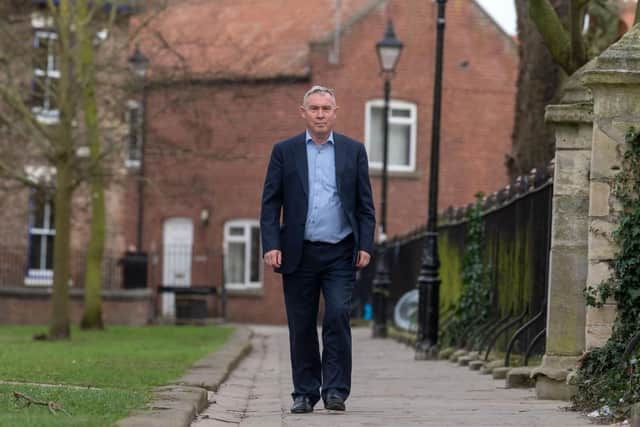Our high streets will still be vital but for different reasons, says Selby council leader Mark Crane


It was at the height of the New Labour years, with Tony Blair at the peak of his powers, when native Londoner Mark Crane turned up at a meeting of local Conservatives in his adopted home district of Selby.
Having joined the Tories a few years earlier he believed in Conservative principles but had little idea of how often the council met or even what all its functions were. But with a local election looming, Tory candidates were needed and applicants were in short supply.
Advertisement
Hide AdAdvertisement
Hide Ad"No-one put their hands up, and I made the mistake or brilliant move of asking what was involved", he recalls.


"Before you could say Jack Robinson I was the candidate. There were so many things I didn't understand but I was keen to get involved and do a good job so I learned."
Two years later he took on the vacant role of Tory group leader on Selby District Council, before two years after that taking over as council leader following a successful election campaign.
Advertisement
Hide AdAdvertisement
Hide AdThat was 16 years ago, making him North Yorkshire's longest serving council leader. And sitting with The Yorkshire Post in a pub in Selby town centre, the 59-year-old father-of-two jokes that while he has lived in the area for 30 years, it will be another ten before he becomes a local.
A lot has changed during his tenure, including the resources at the disposal of his council, with its general fund 30 per cent lower in real terms than when he took over.
It is housing - and the number of people requiring it - where he says the most obvious trend can be seen. After a 30-year hiatus of not building any council homes, he has just opened a development of 13 in the nearby village of Byram and is proud to say that dozens more are on the way.
But he still fears he is up against it in getting the higher quality homes needed and in keeping up with rising demand for housing, something he says is the result of an influx of migrant workers coming into Selby in recent years.
Advertisement
Hide AdAdvertisement
Hide Ad"Particularly the difference for Selby is the number of people from Eastern Europe who have moved to the district to find work," he says.
"Go to East London and you think 'what is he talking about in Selby', but here we started with almost nothing and now we have quite a few thousand people, mainly from Eastern Europe, Poland and Lithuania by and large, who have come to Selby to work.
"They work in food processing plants, food production, in the fields etc, they are doing some of the less well-paid, more menial jobs, I don't mean that to be rude, that is just a fact.
"Those people have also had an impact on our housing market. People need to live somewhere so they will have taken houses in the Selby district and in the town itself, that has caused the need for us to have to build more houses."
Advertisement
Hide AdAdvertisement
Hide AdBrexit - the 'B-word' he hoped he wouldn't have to talk about during the interview as he is "utterly sick of it" - will likely lead to a reduction of people moving to Selby from overseas, he believes.
"But I do think the people already settled here, I don't think on March 30 they will all be getting on planes or boats or whatever and going home," he says.
"Those people will remain because they are bringing up families here, they earn more money here than they do back home, some of them send money back home to family that are struggling in those countries."
One of the 18 Yorkshire leaders who formed the 'coalition of the willing' on region-wide devolution, Coun Crane says he still wants to work together despite the Government rejecting the idea.
Advertisement
Hide AdAdvertisement
Hide AdBut describing himself as a "realist", he advocates trying to make progress on smaller deals that can be done in the shorter-term and then 'see whether you could join them together at some point'.
Local elections are also looming for his council, but with the Brexit process still in the balance he is unsure what impact this will have on his party's chance of success.
"A lot of people are disillusioned with national politicians, some of those are disillusioned with my party, some are perhaps disillusioned with the largest opposition party.
"What you may find is that people either vote protest or stay away from the ballot box to protest at what national politicians are doing. There is a volatile atmosphere as we go into the local elections."
Advertisement
Hide AdAdvertisement
Hide AdOne of Yorkshire's most affluent districts, Selby had been considered a dormitory area due to the numbers of people commuting out to work in well-paid jobs in Leeds and York.
But with nearly 5,000 net jobs created in the last five years, despite large losses at sites such as Kellingley Colliery, Coun Crane says it is now "punching above its weight".
The aim now is to get people both living and working in the district by attracting higher paid jobs. With the Sherburn Enterprise Park expanding and media and digital firms relocating to the village of Church Fenton, hopes are high that this is starting to happen.
With the 950th anniversary of Selby Abbey this year and the first day of the Tour de Yorkshire on May 2 finishing in the town, he says there is plenty to look forward to for locals.
Advertisement
Hide AdAdvertisement
Hide AdBut Coun Crane says his council is keeping a keen eye on the longer-term future of its three largest settlements, Selby, Tadcaster and Sherburn, as changing shopping habits pose an existential threat to high streets nationwide.
The council owns very few properties on the high streets - other than two bank buildings it has bought up in recent years - but he says people still look to the authority to shape them in the best interests of the public.
And he cites the restaurant where he's sitting - which doubles as a steampunk-inspired 'escape room' - and the activities on offer in the replacement to the burnt-down Selby leisure centre as examples of places which add to the vibrancy of a town.
"High streets are going to become more important but for a totally different set of reasons to why they have been in recent years. The days of having half a dozen men's shops and nine ladies' shops and a butcher's a baker's and a candle-stick maker's are probably on the way out.
Advertisement
Hide AdAdvertisement
Hide Ad"Centres need to reflect the areas around them more and more. What we will see is an increase in the number of eating places, in the number of places where people can drop in like coffee shops.
"We will still need to have butcher's and baker's, you can't entirely buy those online, but you have got to accept that a lot of things we have traditionally had on the high, and even banks, are concertinaing, there are far less of them."